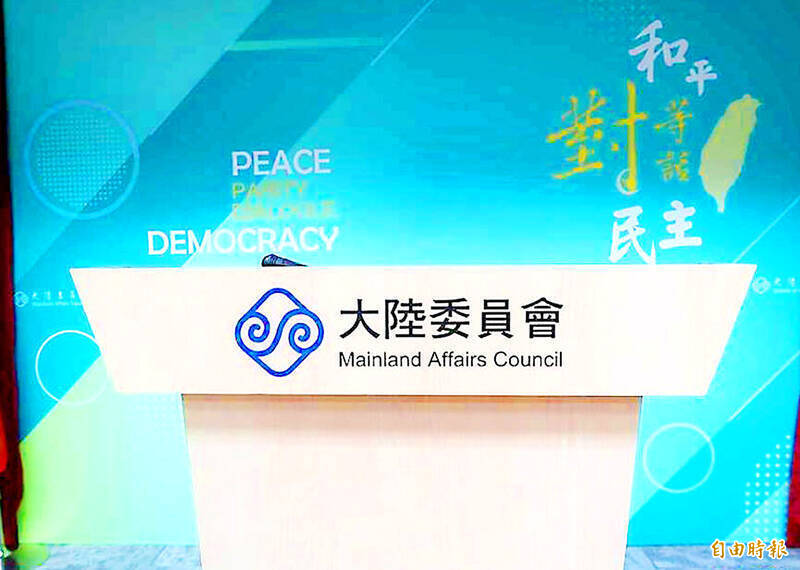《TAIPEI TIMES》MAC slams TAO’s ‘separatist’ section

A podium at the Mainland Affairs Council in Taipei is pictured in an undated photograph. Photo: Chung Li-hua, Taipei Times
‘DOUBLE-FACED’: The objective is to insinuate that Beijing is only targeting ‘die-hard’ independence advocates for punishment, not all Taiwanese, experts said
Staff writer, with CNA
China’s addition of a new section on so-called “die-hard Taiwanese independence separatists” on its Taiwan Affairs Office (TAO) Web site has created “more obstacles and harm in cross-strait interactions,” the Mainland Affairs Council (MAC) said on Thursday.
Such a move hinders exchanges and communication between people on both sides of the Taiwan Strait and does not contribute to promoting positive exchanges, MAC Deputy Minister and spokesman Liang Wen-chieh (梁文傑) said.
The new section, which was set up on Wednesday, lists 10 “die-hard Taiwanese independence separatists” that the TAO announced in 2021 and 2022, including Vice President Hsiao Bi-khim (蕭美琴), Minister of National Defense Wellington Koo (顧立雄) and National Security Council Secretary-General Joseph Wu (吳釗燮).
Previous TAO statements and legal documents about Taiwanese independence, such as a new set of guidelines announced on June 21 targeting “die-hard Taiwanese independence separatists,” are also included in the new section, which features a mailbox for reporting “crimes” and providing evidence against people on the list and other independence advocates.
The guidelines allow courts in China to try “die-hard Taiwanese independence separatists” in absentia, with those convicted of inciting “secession” who also cause “grave harm to the state and the [Chinese] people” potentially being sentenced to death, a report by Xinhua news agency said.
Beijing’s latest move has sparked criticism in Taiwan, drawing condemnation from the opposition Chinese Nationalist Party (KMT) and Taiwan People’s Party, and prompting the Democratic Progressive Party (DPP) to issue a statement that the move was tantamount to inciting mutual attacks between people on both sides of the Strait.
On Thursday, TAO spokesperson Zhu Fenglian (朱鳳蓮), in a news release, accused DPP authorities of deliberately confusing the majority of Taiwanese with a minority of “die-hard Taiwanese independence separatists” and attempting to “drag innocent people into supporting ‘Taiwan independence.’”
In response, Liang said the new section could lead to negative consequences such as encouraging people to report others, citing examples where people were reported not because they support Taiwanese independence, but because of industry competition, personal grudges or differences in opinions.
“If such a trend of encouraging reporting takes hold, it could lead to many people being inexplicably caught up in it,” he added.
Although Chinese authorities have repeatedly claimed that only a small number of people are targeted, that would not be the case if the trend takes hold, Liang said.
Wu Se-chih (吳瑟致), director of Taiwan Thinktank’s China Research Center, said that China’s aim was to make an example of the 10 people on its list to emphasize that it is targeting only “die-hard” independence activists for punishment and reduce concern among ordinary Taiwanese that they would also be affected.
Setting up the new section also demonstrates that action has been taken following the issuance of the new guidelines, he added.
By setting up a mailbox to report those separatists, the Chinese authorities are attempting to enumerate or create conditions that can be defined as supporting Taiwanese independence, he said.
Institute for National Policy Research director Wang Hung-jen (王宏仁) said that the measure is an extension of China’s legal battle with Taiwan, with the goal of instilling fear among Taiwanese to make them more amenable to accepting conditions proposed by Beijing.
China has adopted a more lenient approach toward the general population “to make ordinary Taiwanese feel positively about China while intimidating Taiwanese independence advocates,” he added.
Regarding the mailbox for reporting separatists, Wang said that it is part of China’s strategy to monitor its society, which it has expanded to apply to “die-hard Taiwanese independence advocates.”
新聞來源:TAIPEI TIMES





















